Operation Nemesis
In the previous article (Armenian pogroms in the Ottoman Empire and the massacre of 1915-1916.) was told about the beginning of the Armenian pogroms in this state (which began in 1894) and about the large-scale massacre of Armenians in 1915 and subsequent years, which for the first time in stories was called genocide.
In this part, we will talk about the first Armenian republic and the revenge of Armenians to those involved in the destruction of their fellow tribesmen.
First Armenian Republic
After the collapse of the Russian Empire, on April 22, 1918, the Transcaucasian Democratic Federal Republic was formed, headed by the Menshevik A. Chkhenkeli.
This state formation turned out to be unviable.
And already on May 26, Georgia (in which Chkhenkeli became Minister of Foreign Affairs) separated from its structure. And on May 28, 1918 - Armenia and Azerbaijan.
"Newborn" Armenia immediately grappled with Georgia, and with Azerbaijan, and with Turkey - this was described in the article Fall of the Ottoman Empire.
"26 Baku commissars"
Especially fierce were the interethnic clashes between Armenians and Azerbaijanis: the level of hatred was such that both sides sought not only to expel the strangers, but to physically exterminate them.
Armenians partially destroyed, partially expelled Azerbaijanis from Novobayazet, Erivan, Echmiadzin and Sharur-Daralagez districts.
The Azerbaijanis did the same with the Armenians in Shemakha and Nukha districts, Aghdam and Ganja.
The situation in Baku was difficult, where pogroms of Muslims began in March 1918, supported by the leadership of the Baku commune (where there were many Armenians) and the Dashnaktsutyun party.
On April 25, 1918, the Council of People's Commissars was established in Baku, the head of which was S. Shaumyan. One of these “Baku commissars” was the notorious Anastas Mikoyan.
In June, the troops of the Baku Soviet were defeated by the allied Azerbaijani and Turkish formations near the city of Goychay. Baku was under siege.
The council was "split." And on July 25, the Mensheviks, Right SRs and Dashnaks pushed through the decision to invite the British, who arrived on August 4, into the city.
Before that, on August 1, 1918, the so-called Provisional Dictatorship of the Central Caspian Sea was formed. On August 16, the former leaders of the Baku Soviet tried to sail for Astrakhan. But they were arrested.
The British did not help the Central Caspian.
The situation was critical. Therefore, on September 13, the British evacuated their troops from Baku.
On September 14, they were followed by the leaders of the "Dictatorship". On the night of September 15, 1918, Baku fell. The Azerbaijani units entered the city, which began to take revenge on the Armenians for the killed tribesmen.
The commanders of the regular Turkish units, fearing a loss of discipline, did not want their soldiers to participate in this "bloody orgy." But they could not ban it to the allies either.
Therefore, Turkish troops entered Baku only two days later. Later, the Azerbaijanis also destroyed 28 Armenian villages in the Nukhinsky and Areshsky districts.
The "Baku commissars", whom A. Mikoyan, who was in an illegal position, managed to free on the eve of the entry of Azerbaijani troops into Baku, got to Krasnovodsk on the steamer "Turkmen". Where 25 of them (as well as the 26th commander of the Dashnak detachment Tatevos Amirov) were executed by order of the Transcaspian Provisional Government, controlled by the Social Revolutionaries.
Most often they talk about execution. But some claim they were beheaded.
Sergei Yesenin, in his famous poem, following the official version, attributes the execution to the British.
But by that time they had not yet reached Krasnovodsk.
Mikoyan, as you understand, was not executed. And he lived until 1978, dying at the age of 83 (according to his will, he was buried next to his wife at the Novodevichy cemetery).
Turkish Kemalist General Halil Pasha
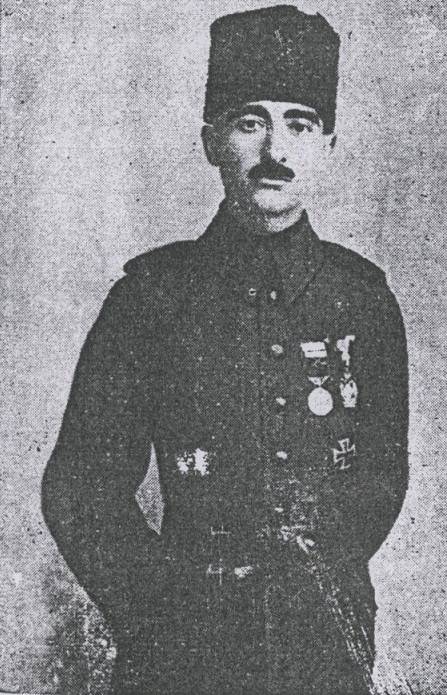
Halil pasha
In April 1920, units of the Red Army entered Azerbaijan and Baku.
Turkish Kemalist officers, led by Khalil Pasha, paid Russia in full for future military and economic aid, deliberately misleading Azerbaijani allies. They argued that the advancing Red Army was headed by their compatriot, Nijat-bek, in whose regiments there were many Volga Turks. And that this army goes to the aid of Turkey - to Anatolia.
Thanks to the efforts of Khalil Pasha, the oil fields of Baku and oil refineries were not destroyed and were handed over to representatives of the new government in a working condition.
From Azerbaijan, Halil Pasha went to Moscow, where in mid-May 1920, as part of a Turkish delegation, he took part in negotiations with the Soviet government, met with Chicherin. Among other things, he promised Turkish support for Moscow's policy among the Muslims of Persia, India (which then included Pakistan) and Afghanistan.
Before leaving for his homeland, Khalil Pasha received a silver dagger from the Central Executive Committee of the RSFSR, which can now be seen in the military museum of Istanbul.
The ancient knot of Nagorno-Karabakh
The situation in Artsakh (Nagorno-Karabakh) was also very tense.
This territory has long been inhabited by Armenians. But then it was conquered by the Turkic Karabakh Khanate. And here the ancestors of modern Azerbaijanis began to settle.
In the first half of the XNUMXth century, Nagorno-Karabakh, along with other regions, became part of Russia. Later it turned out to be part of the Elizavetpol province, inhabited by both Armenians and Azerbaijanis.
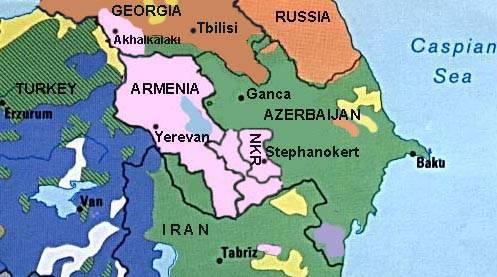
Map of the areas of residence of Armenians today
Every time when the central government weakened, interethnic clashes broke out in Karabakh.
This was the case during the First Russian Revolution of 1905–1907. Then the Armenian pogroms were noted, for example, in the city of Shusha located on the territory of Karabakh.
After the collapse of the Russian Empire and the Transcaucasian Democratic Federative Republic, Azerbaijan declared its entire territory of the Elizavetpol province.
What the Armenians of Karabakh strongly disagreed with: they wanted independence or union with Armenia.
The authorities of the Armenian Republic did not object to the inclusion of Artsakh in their state.
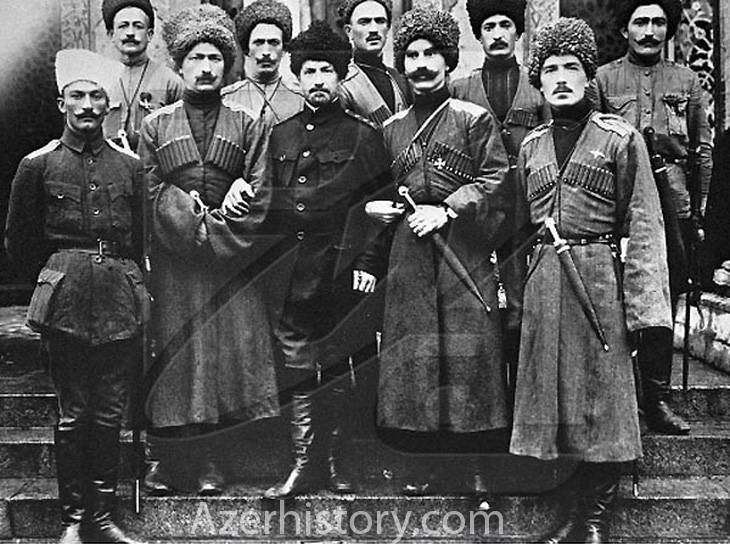
Azerbaijani army officers, 1918
In March 1920, the Armenian quarters were again destroyed in Shusha: from five hundred to two thousand people were killed then, the rest were expelled from the city.
The city was never fully rebuilt. Its population dropped from 67 thousand to 9 thousand people.
But it should be said that this catastrophe was provoked by the Armenians themselves, whose armed militants attacked the Azerbaijani garrisons of Shushi, Askeran and Khankendi on the night of March 23. Moreover, in the latter city a military hospital was attacked.
Interethnic clashes in Transcaucasia ended with the arrival of the Bolsheviks there: both in Azerbaijan and in Armenia they quickly realized that the new Russian government was strong and
no one will allow to cut neighbors now.
From the former Elizavetpol province, lands with an Armenian population were allocated, from which the Nagorno-Karabakh Autonomous Region was formed as part of the Azerbaijan SSR.
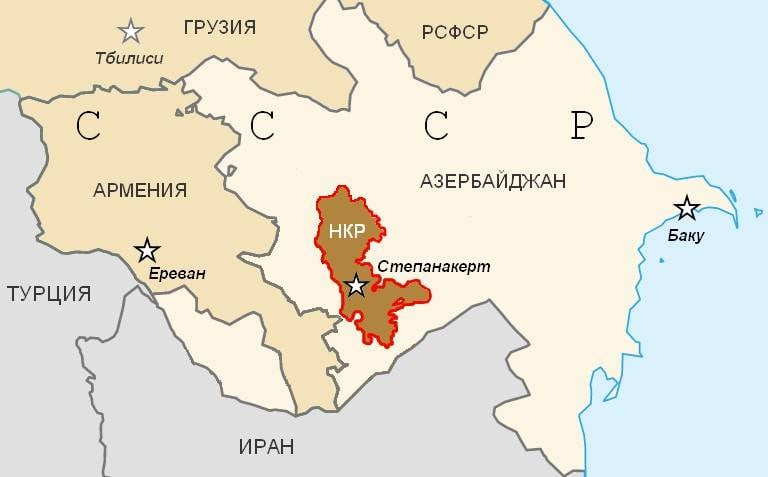
Perhaps this was done because the newly formed autonomous region did not have a border with Armenia.
However, some historians believe that the NKAO was transferred to Azerbaijan under the influence of Turkey, relations with which at that time the Soviet authorities were more than friendly.
Shaan Natalie and the militants of Operation Nemesis
The first Armenian republic lasted only until December 2, 1920.
By that time, she had suffered a crushing defeat in the war with Turkey. And she was forced to conclude the humiliating Peace of Alexandropol, which was annulled after the establishment of Soviet power in Armenia.
This was discussed in the article Fall of the Ottoman Empire.
But the leaders of the Dashnaktsutyun party at the IX Congress (Yerevan, October 1919) managed to make a decision to carry out an operation to physically destroy the Turkish leaders, who were guilty of organizing the massacres of Armenians in 1915, and the rulers of Azerbaijan, involved in the massacre of Armenians in Shusha and in Baku in 1918-1920
The initiator of this operation, called "Nemesis" (after the name of the ancient Greek goddess of justice), was Hakob Ter-Hakobyan, better known as Shaan (Shagan) Natali - a pseudonym consisting of the names of his father and the woman he loved. Ter-Hakobyan's father and many relatives were killed in 1894-1896.
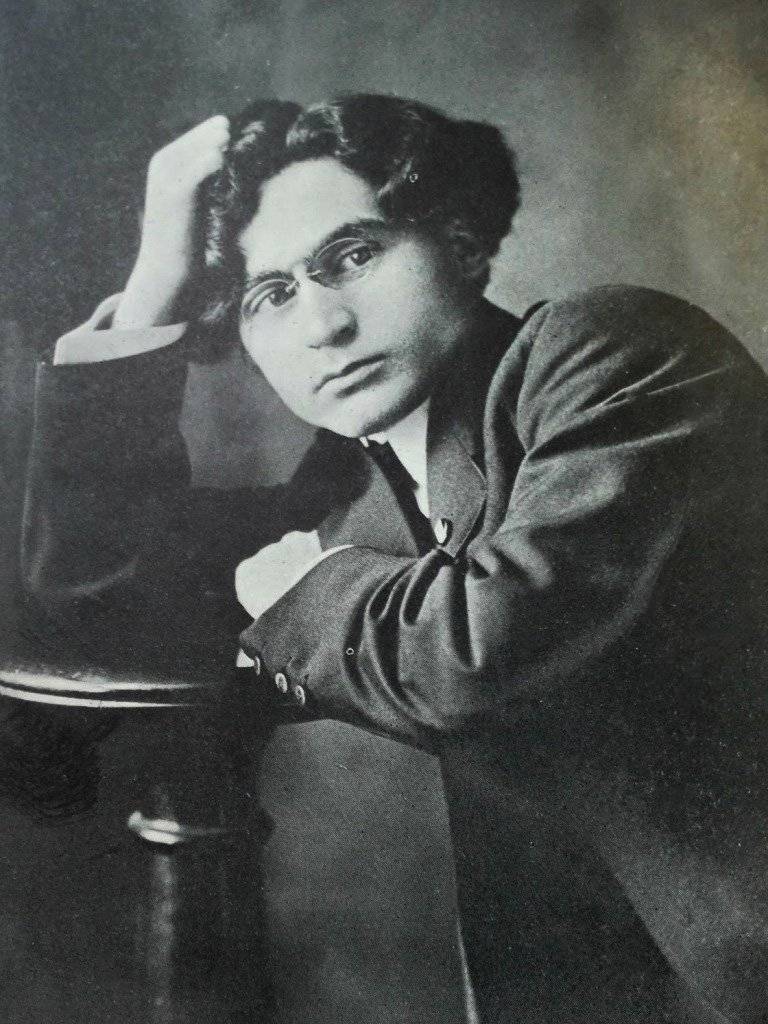
Shahan Natali (Hakob Ter-Hakobyan). It is hard to believe that this "book boy" became the organizer of one of the most effective punitive operations in world history.
His opponents then were members of the Bureau of the Dashnaktsutyun Party Simon Vratsyan, Ruben Ter-Minasyan, and Ruben Darbinyan. Later Ter-Hakobyan wrote about the reasons for his decision:
And should you at all ...
The recipe for progressive mankind resembled a diagnosis: complete amnesia!
We were advised to forget everything: stabbed parents, sisters, children, and finally, the Motherland, in order to be able to take revenge in a "civilized" manner on the executioner hiding under a false name.
Advice, to be sure, is very wise, especially when it is given to a bloody victim. "
Hakob Ter-Hakobyan (Shaan Natali) and Grigor Merjanov (a participant in battles with Azerbaijanis in 1905, in 1915-1918 he served in the Bulgarian army) became the immediate leaders of Operation Nemesis.
The main informant of the headquarters of the operation "Nemesis" was Hrach Papazyan, who, disguised as a Turkish student, managed to become his own man among the Young Turkish emigrants.
A unique feature of the liquidation acts prepared by Ter-Hakobyan and Merjanov was that not a single bystander was injured during their implementation. Each group of performers consisted of three to five people who established observation of a potential victim and determined the place and time of the attack. If the condemned did not have bodyguards, one person was sent to the action, otherwise two or three conspirators could attack him at the same time.
The first step was to compile a list of 650 people involved in the deportations and murders of Armenians.
The leaders of the operation were still realistic. They understood the limitations of their resources. And so they focused their efforts on eliminating the most odious
As a result, 41 of them were sentenced to death.
Former Minister of Internal Affairs of the Ottoman Empire Mehmed Talaat Pasha was chosen as target number 1.
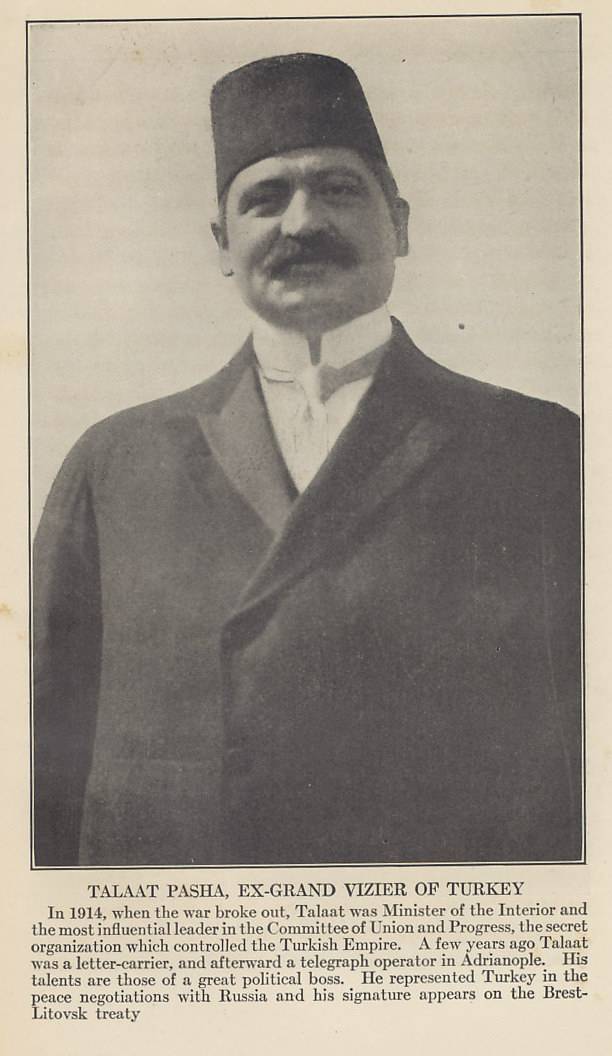
Talaat Pasha
Soghomon Tehlirian was sent to "hunt" for him, whom Ter-Hakobyan ordered to remain at the place of the punitive act and wait for the police, putting his foot on the corpse, and then allow himself to be arrested without resistance.
At the trial, Tehlirian had to convey to the world community the truth about the deeds of Talaat and the tragedy of the Armenian people. Everything turned out exactly as Ter-Hakobyan intended: Talaat was killed in Berlin on March 15, 1921, and on December 6 of the same year, the German court acquitted Tehlirian.
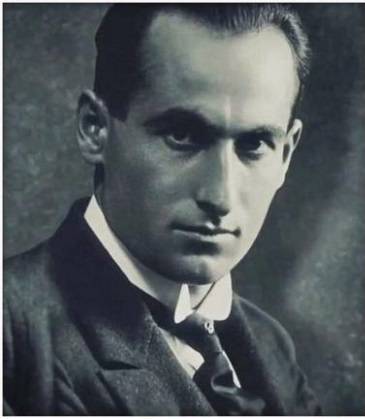
Soghomon Tehlirian
The trial was attended by a Polish journalist (a native of the Grodno region of modern Belarus) Rafael Lemkin, who, having heard the testimony of witnesses about the massacres of Armenians, began to study the history of the issue and eventually came up with a new term - "genocide".
He first used it in 1944 in his book "The Rule of the Axis States in Occupied Europe", where he cited "the extermination of Armenians in 1915" as an example.
On June 19, 1920, the former Prime Minister of the Azerbaijan Democratic Republic, Fatali Khan Khoysky, was killed in Tiflis and the former Minister of Justice of Azerbaijan Khalil-bey Khasmamedov, who were found guilty of organizing pogroms and massacres of Armenians in Baku by the leaders of Nemesis (in September 1918). The executors were Aram Yerkanyan and Misak Kirakosyan (he was wounded during this operation).
Grigor Merzhanov himself, as part of one of the groups, took part in the operation to eliminate Said Khali Pasha (Grand Vizier of the Ottoman Empire in the period 1913-1917): on December 6, 1921, he was killed in Rome by Arshavir Shirakyan.
On April 17 of the following 1922, Arshavir Shirakyan and Aram Yerkanyan, already familiar to us, shot and killed the former governor of Trebizond Dzhemal Azmi in Berlin (by his order, 15 thousand Armenians were drowned in this city) and the creator of the "Special Organization" (counterintelligence - "Teshkilatiya Makhsuse") Behaeddin Shakiredin -pow. During this action, one of Shakir's guards was also killed.
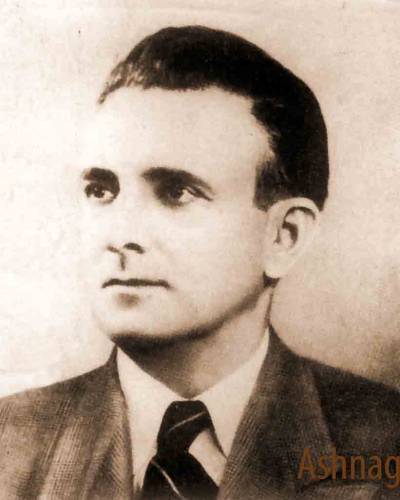
Arshavir Shirakyan
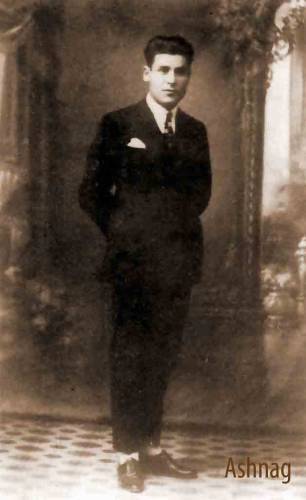
Aram Yerkanyan
A few months later, the same group in Tiflis killed the commander-in-chief of the fourth Ottoman army Kemal Pasha.
Also in Tiflis a group which included S. Tsagikyan, A. Gevorgyan, P. Ter-Poghosyan and Z. Melik-Shahnazaryan on July 25, 1922
Ahmed Jemal Pasha (one of the members of the "Young Turk Triumvirate"), who was also "famous" for repressions against the Lebanese and Syrian Shiites and was nicknamed Al-Saffah - "bloody butcher" in the Middle East.
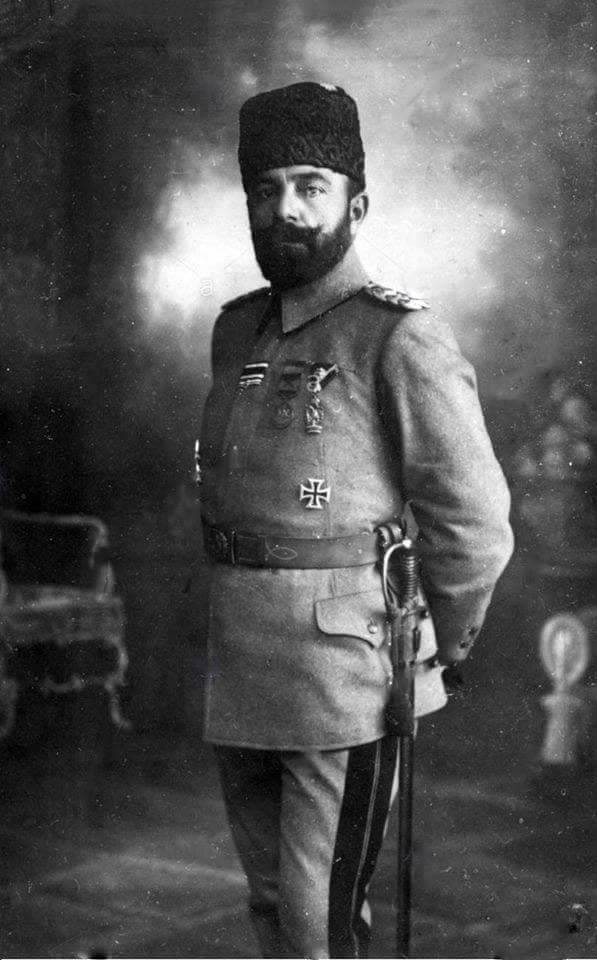
At that time, Jemal Pasha was a military adviser to the Afghan government and in Tiflis he was on his way to Turkey, where he was going to meet with Mustafa Kemal.
Another member of the "Young Turk Triumvirate" is the former Minister of War of the Ottoman Empire, Ismail Enver (Enver Pasha), who fled from Constantinople. He tried to offer his services to the Bolsheviks - as an expert on "East" and Turkestan. Sent to Bukhara, in the summer of 1921 he surrendered to the Basmachs, commanded by Ibrahim-bek of the Uzbek tribe Lokai.
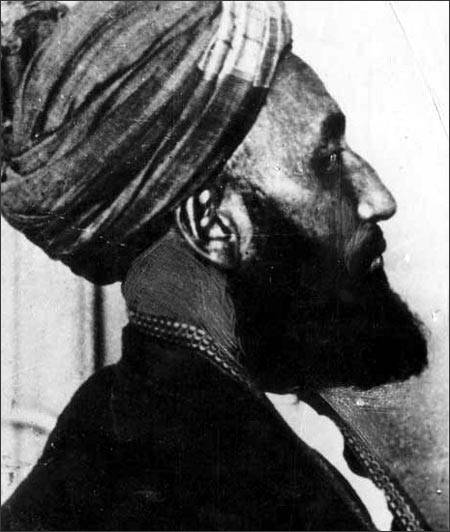
Captured Ibrahim-bek. Photo taken in 1931, shortly before the execution
Ibrahim treated the former Ottoman minister without any respect: he robbed him and held him for three months as a prisoner.
However, in the fall of the same year, Enver unexpectedly turned out to be the commander-in-chief of the Basmach detachments of Bukhara and Khiva. In February 1922, he even captured Dushanbe and most of the territory of the former Bukhara Khanate. But already in May of this year, Red Army units inflicted several serious defeats on him and drove him out of Dushanbe.
Ibrahim-bek, who did not harbor any warm feelings for Enver, not only did not help the visiting Turk, but even attacked his detachment in the Lokai Valley, patting him well.
On August 4, Ismail Enver died in a battle in the village of Chagan (the territory of modern Tajikistan). Some argue that he was killed by Yakov Melkumov (Hakob Melkumyan), who was the interim commander of the First Turkestan Cavalry Division. Allegedly, it was for this that he was awarded the second Order of the Red Banner.
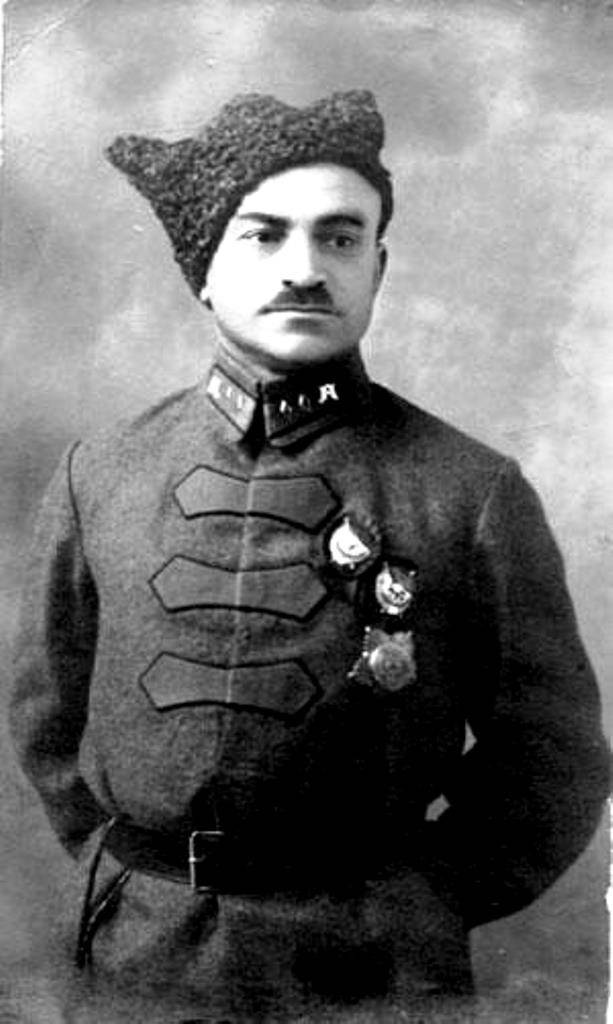
Hakob Melkumov
Former general secretary of the Young Turk party "Unity and Progress" Nazim-bey Selanikli (ideologist of the Armenian massacre), the participants in the "Nemesis" operation failed to kill.
He was hanged by the Turks themselves - in 1926 for an attempt to assassinate Gazi Mustafa Kemal (not yet Ataturk).
Several Armenian collaborators were killed in Constantinople as part of Operation Nemesis. Among them were Mkrtich Harutyunyan, who served in the Ottoman secret police, who was shot by Soghomon Tehlerian (after that he went to Berlin to kill Talaat), Vahe Yesayan, who participated in drawing up lists for deportation (killed by Arshavir Shirakyan), Amayak Aramyants, who in 1914 betrayed to the Ottomans the participants in the conspiracy against Talaat Pasha (shot by Arshak Yezdanyan).
Also in Constantinople on July 19, 1921, a group of Misak Torlakyan, Yervand Fundukyan and Harutyun Harutyunyants liquidated the former Minister of Internal Affairs of Azerbaijan Behbud Khan Jivanshir and wounded Behbud.
The direct executor was Torlakyan. He was arrested by the British occupation authorities, but the judges of the military tribunal released him from punishment, claiming that the murder was committed by him in a state of passion.
After Nemesis
The fate of the participants in Operation Nemesis developed in different ways.
Hakob Ter-Hakobyan (Shahan Natali) was known as an Armenian writer, poet and philosopher, died in the USA.
Grigor Merzhanov left the Dashnaktsutyun party in 1922, accusing its leadership of "lack of principle". Lived in Paris.
Hrach Papazyan was a member of the Syrian parliament, and shortly before his death he moved to Lebanon.
Arshavir Shirakanyan opened an oriental carpet store in New York.
Aram Yerkanyan has changed many countries. In Argentina, he was the editor of the newspaper "My Armenia". He died of tuberculosis in Cordoba.
Soghomon Tehlirian lived in Serbia for a long time, before his death he moved to the United States.
Zare Melik-Shakhnazarov worked in the Transcaucasian Central Executive Committee, in the construction organizations of Sumgait and in the Universal Education of Azerbaijan. During the Great Patriotic War, he was a shooting instructor. He died in 1992.
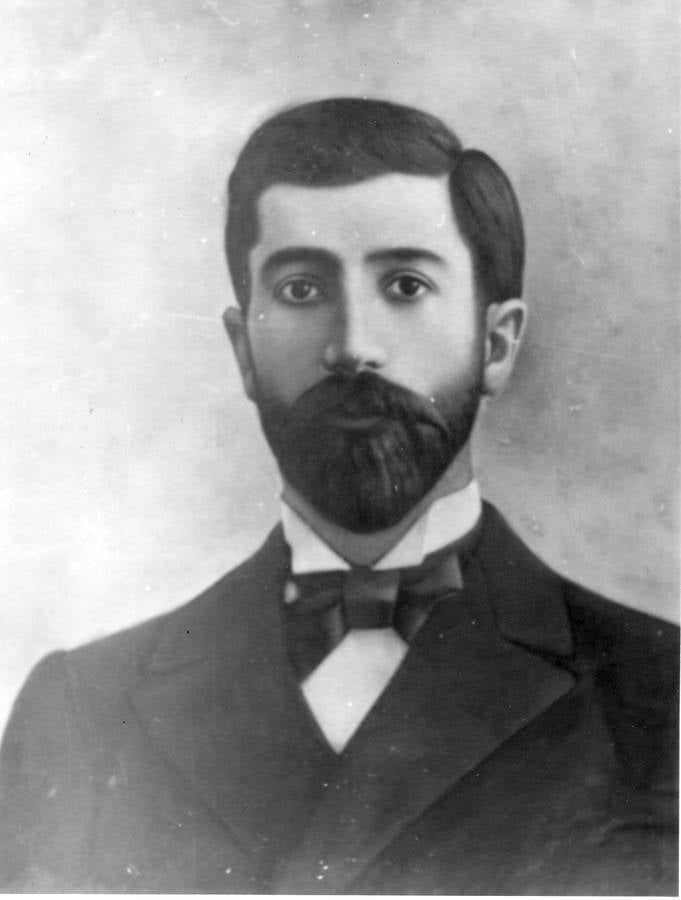
Zare Melik-Shakhnazarov. Photo from the book "Notes of a Karabakh Soldier"
During World War II, Misak Torlakyan joined the ranks of the Armenian Legion, was arrested by the American military, but released, since it was recognized that he did not commit war crimes.
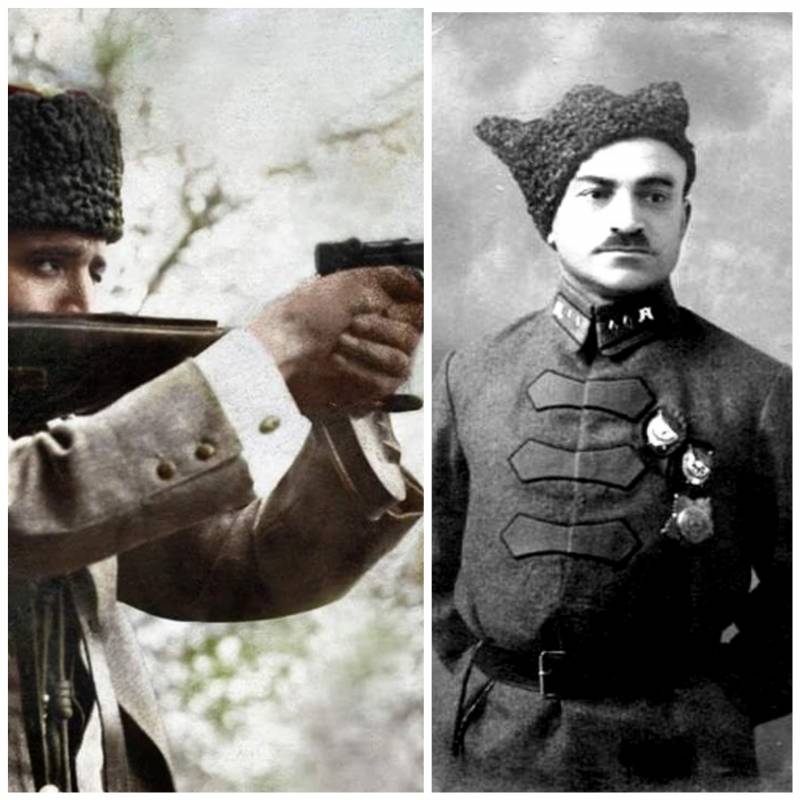
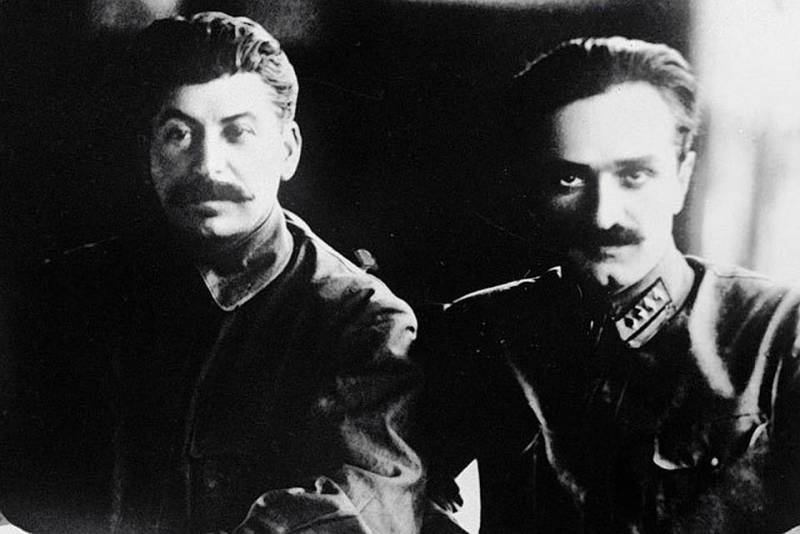
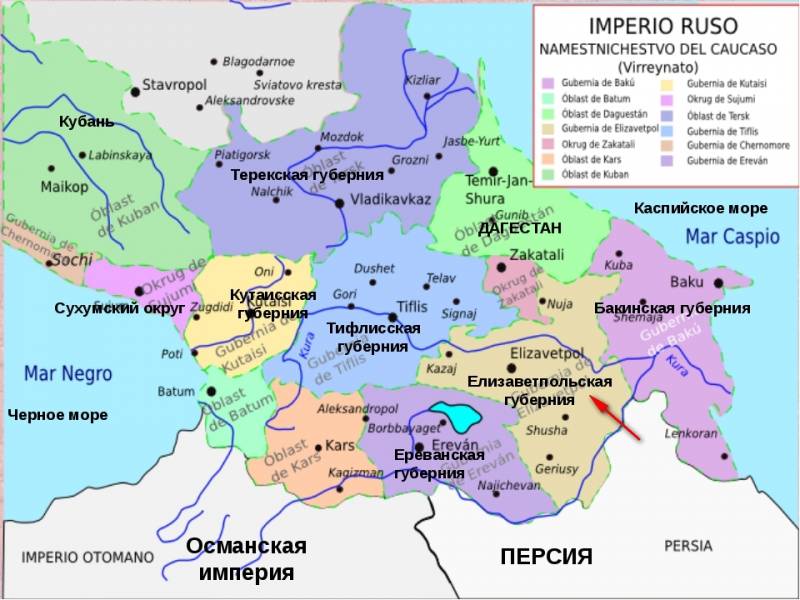
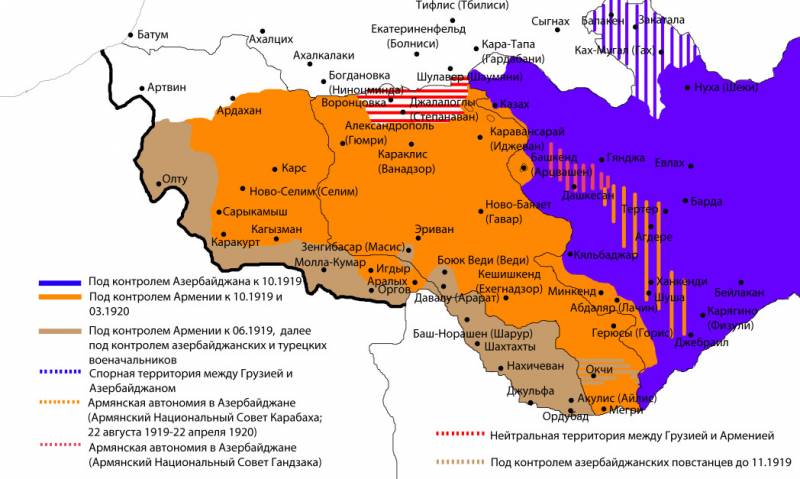
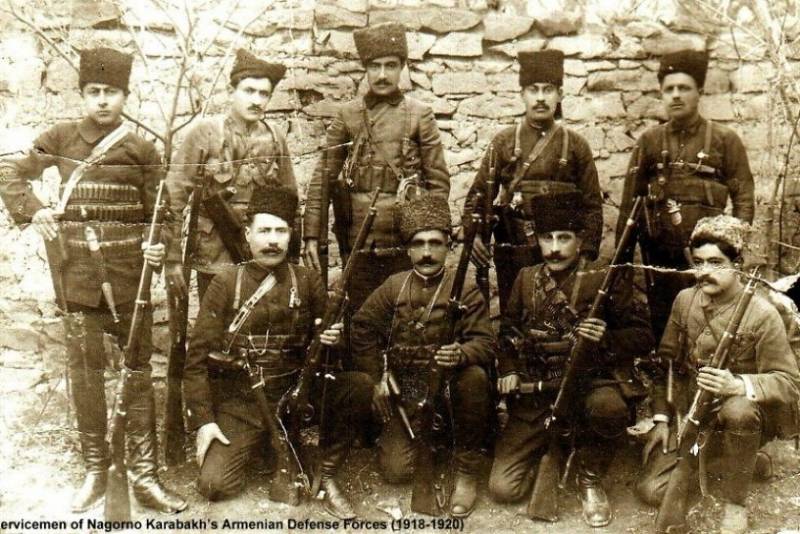
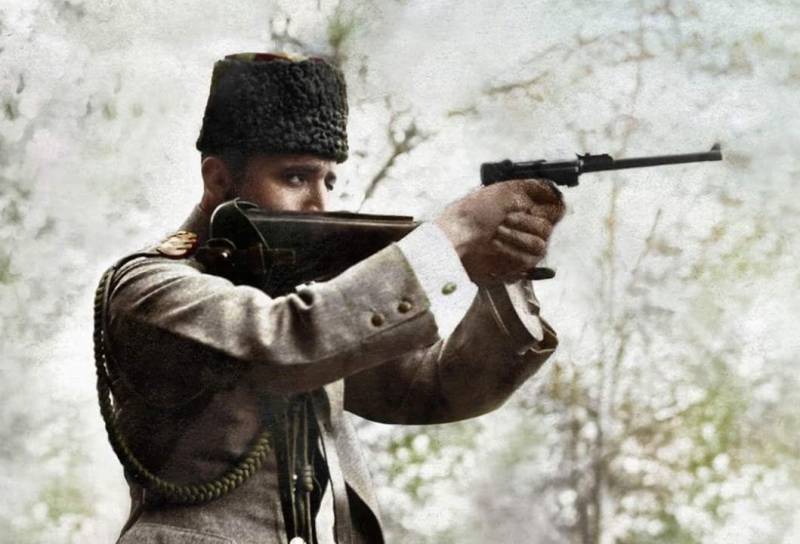
Information